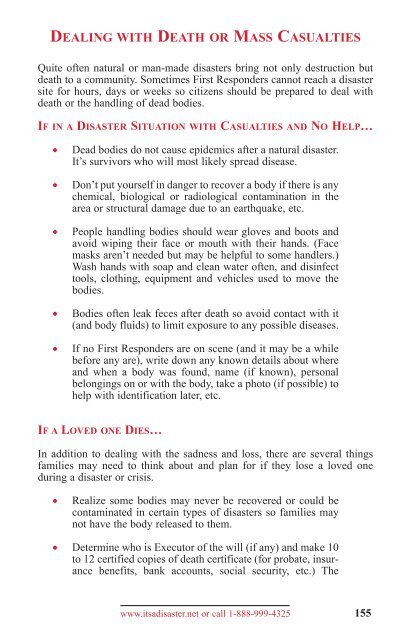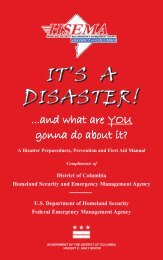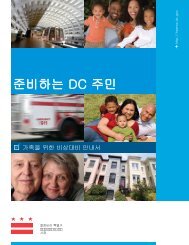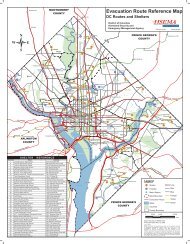- Page 1 and 2:
IT’S A DISASTER! ...and what are
- Page 3 and 4:
MESSAGE FROM THE DIRECTOR Dear Resi
- Page 5 and 6:
EVACUATION The District Department
- Page 7 and 8:
DISTRICT DEPARTMENT OF THE ENVIRONM
- Page 9 and 10:
IMPORTANT DISTRICT TELEPHONE NUMBER
- Page 11 and 12:
DISTRICT EMERGENCY SHELTERS These s
- Page 13 and 14:
DISTRICT EMERGENCY SHELTERS (CONTIN
- Page 15 and 16:
IT’S A DISASTER! …and what are
- Page 17 and 18:
DEDICATION This manual is dedicated
- Page 19 and 20:
CONTENTS Disclaimer . . . . . . . .
- Page 21 and 22:
Smallpox . . . . . . . . . . . . .
- Page 23 and 24:
Heat-Related Illnesses . . . . . .
- Page 25 and 26:
DISASTER FACTS & FIGURES Both natur
- Page 27 and 28:
FACTS & FIGURES BY TYPE OF DISASTER
- Page 29 and 30:
Terrorism Between 1993 and 2006 the
- Page 31 and 32:
Section 1 Family Emergency Plan, Ki
- Page 33 and 34:
[ ] Take a basic first aid and CPR
- Page 35 and 36:
TIPS FOR PETS OR LIVESTOCK / LARGE
- Page 37 and 38:
EMERGENCY PLAN, continued Family Do
- Page 39 and 40:
[ ] Keep at least a three-day suppl
- Page 41 and 42:
- Antacid (for upset stomach) - Ant
- Page 43 and 44:
[ ] Signal flares [ ] Small hand to
- Page 45 and 46:
[ ] Denture needs [ ] Extra eye gla
- Page 47 and 48:
[ ] Water … as much as you can fi
- Page 49 and 50:
Section 2 Disaster Preparedness, Pr
- Page 51 and 52:
Soon we’ll explain what to do BEF
- Page 53 and 54:
Move valuables to higher ground If
- Page 55 and 56:
Landscape wisely Plant fire-resista
- Page 57 and 58:
Consider building a shelter or “s
- Page 59 and 60:
Remember ... it’s not a matter of
- Page 61 and 62:
What are YOU gonna do about… AVAL
- Page 63 and 64:
Stick it out - If you are lucky eno
- Page 65 and 66:
Move it! - Whether you are in a veh
- Page 67 and 68:
What are YOU gonna do about… AN E
- Page 69 and 70:
systems may go on. • DO NOT use t
- Page 71 and 72:
What are YOU gonna do about… AN E
- Page 73 and 74:
plenty of water. Leave bathroom doo
- Page 75 and 76:
• If washing dishes or clothes, m
- Page 77 and 78:
Know how to shut off power - Know w
- Page 79 and 80:
Wildfires are intense fires that ar
- Page 81 and 82:
What are YOU gonna do about… A FL
- Page 83 and 84:
AFTER A FLOOD (OR HEAVY RAIN): Thin
- Page 85 and 86:
IF INDOORS - Stay inside until the
- Page 87 and 88:
transportation accident involving h
- Page 89 and 90:
Strange vapors or danger - Report a
- Page 91 and 92:
Typhoon - used in Northwest Pacific
- Page 93 and 94:
• Fill up your car with fuel. •
- Page 95 and 96:
Use bleach - The best thing to use
- Page 97 and 98:
What is the most dangerous part of
- Page 99 and 100:
Make a plan - Review Section 1 to d
- Page 101 and 102:
What are YOU gonna do about… TERR
- Page 103 and 104:
Firefighters (over 70% are voluntee
- Page 105 and 106:
Elevated Threat Alert - Warns of a
- Page 107 and 108:
BEFORE A CYBER ATTACK: Protect comp
- Page 109 and 110:
are many types of chemical agents -
- Page 111 and 112:
leading to death. Survivors of seri
- Page 113 and 114:
Signs & Symptoms: Depends on how mu
- Page 115 and 116:
... if in building - get outside to
- Page 117 and 118:
Things to avoid: • chemicals - an
- Page 119 and 120:
spread by critters like birds, mice
- Page 121 and 122:
infected with bacterium (bubonic),
- Page 123 and 124:
controlled laboratories in the U.S.
- Page 125 and 126:
up to 14 days) ... may include feve
- Page 127 and 128: y authorities and, if so, where you
- Page 129 and 130: difficult when the source of the ra
- Page 131 and 132: • flying debris - many blast inju
- Page 133 and 134: ABOUT NUCLEAR THREAT OR DEVICE No o
- Page 135 and 136: EMP AREA BY BURSTS AT 30, 120 AND 3
- Page 137 and 138: (pronounced “rent-gens” and abb
- Page 139 and 140: So how do I protect myself and my f
- Page 141 and 142: The numbers in the graphic (on prev
- Page 143 and 144: test batteries every 6 months as di
- Page 145 and 146: Crisis Preparedness Handbook: A Com
- Page 147 and 148: few days so find heavy shielding. F
- Page 149 and 150: Water - Until water supplies can be
- Page 151 and 152: What are YOU gonna do about… A TH
- Page 153 and 154: What are YOU gonna do about… A TO
- Page 155 and 156: Take cover - If you hear or see a t
- Page 157 and 158: • Advisory - an earthquake has oc
- Page 159 and 160: What are YOU gonna do about… A VO
- Page 161 and 162: • Listen for creaking on your roo
- Page 163 and 164: • calcium chloride - good for mel
- Page 165 and 166: • give a sign - turn on hazard li
- Page 167 and 168: Deal with it - Recognize your own f
- Page 169 and 170: Watch out - Look for critters, espe
- Page 171 and 172: U.S. are declared. In severe disast
- Page 173 and 174: FEMA recommends the following mitig
- Page 175 and 176: TIPS ON USING HOUSEHOLD FOODS COOKI
- Page 177: TIPS ON SANITATION OF HUMAN WASTE I
- Page 181 and 182: Section 3 Information & Tips on Bas
- Page 183 and 184: TIPS ON MAKING YOUR “EMERGENCY AC
- Page 185 and 186: TIPS ON REDUCING THE SPREAD OF GERM
- Page 187 and 188: What to do… • Run away from are
- Page 189 and 190: • Don’t put repellent on small
- Page 191 and 192: • If possible and safe, remove ve
- Page 193 and 194: What are YOU gonna do about… BLEE
- Page 195 and 196: What are YOU gonna do about… BREA
- Page 197 and 198: What are YOU gonna do about… BROK
- Page 199 and 200: • DO NOT apply any creams, oils o
- Page 201 and 202: What are YOU gonna do about… CHOK
- Page 203 and 204: What are YOU gonna do about… COLD
- Page 205 and 206: What are YOU gonna do about… CONV
- Page 207 and 208: What are YOU gonna do about… DROW
- Page 209 and 210: What are YOU gonna do about… EYE
- Page 211 and 212: What are YOU gonna do about… HEAD
- Page 213 and 214: CARDIAC ARREST (GIVING CPR) Main th
- Page 215 and 216: CPR POSITION FOR CHILDREN (1 - 8 YE
- Page 217 and 218: What are YOU gonna do about… HEAT
- Page 219 and 220: What are YOU gonna do about… INFE
- Page 221 and 222: Spanish flu pandemic of 1918-1919 w
- Page 223 and 224: primarily by touching people or thi
- Page 225 and 226: POISON - INHALED BY BREATHING Revie
- Page 227 and 228: Illustration 3-4 Poison Ivy Illustr
- Page 229 and 230:
POISON - SWALLOWED See TERRORISM (i
- Page 231 and 232:
What are YOU gonna do about… A ST
- Page 233 and 234:
Section 4 Emergency Contact Names &
- Page 235 and 236:
ABOUT THE SALVATION ARMY The Salvat
- Page 237 and 238:
STATE & TERRITORY EMERGENCY MANAGEM
- Page 239 and 240:
Nebraska Emergency Management Agenc
- Page 241 and 242:
warning and disaster tracking servi
- Page 243 and 244:
magnitude. Some areas of responsibi
- Page 245 and 246:
New Brunswick New Brunswick Emergen
- Page 247 and 248:
Neighborhood Watch incorporates ter
- Page 249 and 250:
APPENDIX B Business Continuity (Pla
- Page 251 and 252:
• If possible, know who’s in th
- Page 253 and 254:
• Other Businesses/Immediate Neig
- Page 255 and 256:
Cyber threats - Computer crime and
- Page 257 and 258:
& Industry. It is a step-by-step ap
- Page 259 and 260:
Jane’s (company offers comprehens
- Page 261 and 262:
American Heart Association. Hands-O
- Page 263 and 264:
Emergencies, Dirty Bombs, Atlanta,
- Page 265 and 266:
Mayell, Mark and the Editors of Nat
- Page 267 and 268:
U.S. Department of the Interior, U.
- Page 269 and 270:
INDEX A activated charcoal, first a
- Page 271 and 272:
sunburn, first aid treatment, 176 b
- Page 273 and 274:
chemical spill. See hazardous mater
- Page 275 and 276:
expanding for a nuclear threat or a
- Page 277 and 278:
alerts and information on national
- Page 279 and 280:
frostbite, first aid information, 1
- Page 281 and 282:
landslides about, 37, 39-40 facts a
- Page 283 and 284:
clean up before entering shelter, 1
- Page 285 and 286:
types of, 112 using potassium iodid
- Page 287 and 288:
long-term, 147 pets and, 24, 150 sh
- Page 289 and 290:
safety information, 135-137 tephra,
- Page 291:
One City...One Plan...Our Preparedn





